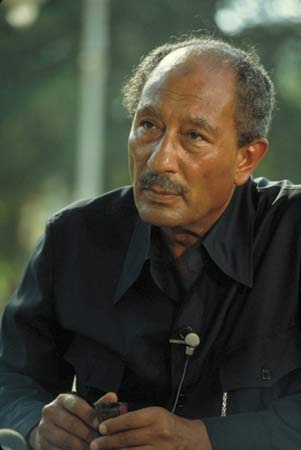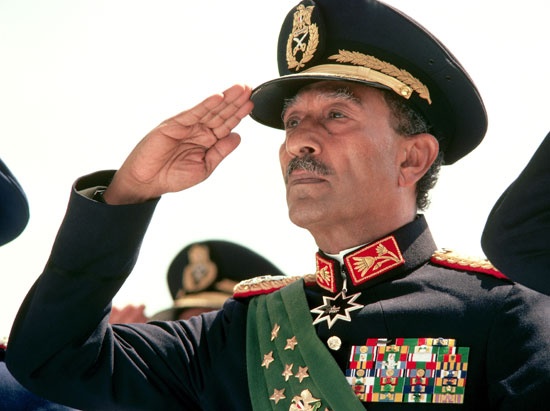Sādāt, Anwar el-
president of Egypt
in full Muḥammad Anwar el-Sādāt, el-Sādāt also spelled al-Sādāt
born Dec. 25, 1918, Mit Abū al-Kawm, Al-Minūfiyyah governorate, Egypt
died Oct. 6, 1981, Cairo
 Egyptian army officer and politician who was president of Egypt from 1970 until his assassination in 1981. He initiated serious peace negotiations with Israel, an achievement for which he shared the 1978 Nobel Prize for Peace with Israeli Prime Minister Menachem Begin (Begin, Menachem). Under their leadership, Egypt and Israel made peace with each other in 1979.
Egyptian army officer and politician who was president of Egypt from 1970 until his assassination in 1981. He initiated serious peace negotiations with Israel, an achievement for which he shared the 1978 Nobel Prize for Peace with Israeli Prime Minister Menachem Begin (Begin, Menachem). Under their leadership, Egypt and Israel made peace with each other in 1979. Sādāt graduated from the Cairo Military Academy in 1938. During World War II he plotted to expel the British from Egypt with the help of the Germans. The British arrested and imprisoned him in 1942, but he escaped two years later. In 1946 Sādāt was arrested after being implicated in the assassination of pro-British minister Amīn ʿUthmān; he was imprisoned until his acquittal in 1948. In 1950 he joined Gamal Abdel Nasser (Nasser, Gamal Abdel)'s Free Officers organization; he participated in its armed coup against the Egyptian monarchy in 1952 and supported Nasser's election to the presidency in 1956. Sādāt held various high offices that led to his serving in the vice presidency (1964–66, 1969–70). He became acting president upon Nasser's death, on Sept. 28, 1970, and was elected president in a plebiscite on October 15.
Sādāt graduated from the Cairo Military Academy in 1938. During World War II he plotted to expel the British from Egypt with the help of the Germans. The British arrested and imprisoned him in 1942, but he escaped two years later. In 1946 Sādāt was arrested after being implicated in the assassination of pro-British minister Amīn ʿUthmān; he was imprisoned until his acquittal in 1948. In 1950 he joined Gamal Abdel Nasser (Nasser, Gamal Abdel)'s Free Officers organization; he participated in its armed coup against the Egyptian monarchy in 1952 and supported Nasser's election to the presidency in 1956. Sādāt held various high offices that led to his serving in the vice presidency (1964–66, 1969–70). He became acting president upon Nasser's death, on Sept. 28, 1970, and was elected president in a plebiscite on October 15.Sādāt's domestic and foreign policies were partly a reaction against those of Nasser and reflected Sādāt's efforts to emerge from his predecessor's shadow. One of Sādāt's most important domestic initiatives was the open-door policy known as infitāḥ (Arabic: “opening”), a program of dramatic economic change that included decentralization and diversification of the economy as well as efforts to attract trade and foreign investment. Sādāt's efforts to liberalize the economy came at significant cost, including high inflation and an uneven distribution of wealth, deepening inequality and leading to discontent that would later contribute to food riots in January 1977.
It was in foreign affairs that Sādāt made his most dramatic efforts. Feeling that the Soviet Union (Union of Soviet Socialist Republics) gave him inadequate support in Egypt's continuing confrontation with Israel, he expelled thousands of Soviet technicians and advisers from the country in 1972. In addition, Egyptian peace overtures toward Israel were initiated early in Sādāt's presidency, when he made known his willingness to reach a peaceful settlement if Israel returned the Sinai Peninsula (captured by that country in the June 【Six-Day】 War of 1967). Following the failure of this initiative, Sādāt launched a military attack in coordination with Syria to retake the territory, sparking the October (Yom Kippur (Arab-Israeli wars)) War of 1973. The Egyptian army achieved a tactical surprise in its attack on the Israeli-held territory, and, though Israel successfully counterattacked, Sādāt emerged from the war with greatly enhanced prestige as the first Arab leader to have actually retaken some territory from Israel. (See Arab-Israeli wars.)

 After the war, Sādāt began to work toward peace in the Middle East. He made a historic visit to Israel (Nov. 19–20, 1977), during which he traveled to Jerusalem to place his plan for a peace settlement before the Israeli Knesset (parliament). This initiated a series of diplomatic efforts that Sādāt continued despite strong opposition from most of the Arab world and the Soviet Union. U.S. Pres. Jimmy Carter (Carter, Jimmy) mediated the negotiations between Sādāt and Begin that resulted in the Camp David Accords (Sept. 17, 1978), a preliminary peace agreement between Egypt and Israel. Sādāt and Begin were awarded the Nobel Prize for Peace in 1978, and their continued political negotiations resulted in the signing on March 26, 1979, of a treaty of peace between Egypt and Israel—the first between the latter and any Arab country.
After the war, Sādāt began to work toward peace in the Middle East. He made a historic visit to Israel (Nov. 19–20, 1977), during which he traveled to Jerusalem to place his plan for a peace settlement before the Israeli Knesset (parliament). This initiated a series of diplomatic efforts that Sādāt continued despite strong opposition from most of the Arab world and the Soviet Union. U.S. Pres. Jimmy Carter (Carter, Jimmy) mediated the negotiations between Sādāt and Begin that resulted in the Camp David Accords (Sept. 17, 1978), a preliminary peace agreement between Egypt and Israel. Sādāt and Begin were awarded the Nobel Prize for Peace in 1978, and their continued political negotiations resulted in the signing on March 26, 1979, of a treaty of peace between Egypt and Israel—the first between the latter and any Arab country.While Sādāt's popularity rose in the West, it fell dramatically in Egypt because of internal opposition to the treaty, a worsening economic crisis, and Sādāt's suppression of the resulting public dissent. In September 1981 he ordered a massive police strike against his opponents, jailing more than 1,500 people from across the political spectrum. The following month Sādāt was assassinated by Muslim extremists during the Armed Forces Day military parade commemorating the Yom Kippur War.
Sādāt's autobiography, In Search of Identity, was published in 1978.
Additional Reading
Studies of Sādāt's life and achievements include Raymond A. Hinnebusch, Egyptian Politics Under Sadat: The Post-Populist Development of an Authoritarian-Modernizing State, 2nd ed. (1985); Raphael Israeli, Man of Defiance: A Political Biography of Anwar Sadat (1985); Felipe Fernández-Armesto, Sadat and His Statecraft, 2nd ed. (1983); Muḥammad Ḥasanayn Haykal, Autumn of Fury: The Assassination of Sadat (1983); and David Hirst and Irene Beeson, Sadat (1981).
- cherub
- Cherubini, Luigi
- Cheruiyot, Robert Kipkoech
- chervil
- Cherwell
- Chesapeake
- Chesapeake and Delaware Canal
- Chesapeake and Ohio Canal
- Chesapeake and Ohio Railway Company
- Chesapeake Bay
- Chesapeake Bay Bridge-Tunnel
- Chesapeake Bay retriever
- Cheselden, William
- Cheshire
- Chesil Beach
- Chesley Bonestell
- Chesney, Francis Rawdon
- Chesnut, Mary Boykin Miller
- Chesnutt, Charles W.
- chess
- Chessman, Caryl
- Chessmaster
- chest
- Chester
- Chester A. Arthur